Podcast: Play in new window | Download
![]() New guidance from the U.S. Department of Labor is changing how employers should track FMLA leave tied to medical appointments. In this episode of California Employment News, Weintraub Tobin shareholders Lizbeth (Beth) V. West and Meagan Bainbridge break down the DOL’s recent opinion letter and provide a practical refresher on how to properly calculate and track FMLA leave in a variety of scenarios.
New guidance from the U.S. Department of Labor is changing how employers should track FMLA leave tied to medical appointments. In this episode of California Employment News, Weintraub Tobin shareholders Lizbeth (Beth) V. West and Meagan Bainbridge break down the DOL’s recent opinion letter and provide a practical refresher on how to properly calculate and track FMLA leave in a variety of scenarios.
In this episode of California Employment News, Weintraub Tobin attorneys Lizbeth (Beth) V. West and Meagan Bainbridge discuss:
Continue reading Calculating and Tracking FMLA Leave Including Travel to Medical Appointments
 In this episode of California Employment News, we break down AB 692, a law that places significant limits on so called “stay or pay” provisions in contracts between employers and workers in California.
Weintraub Tobin attorneys
In this episode of California Employment News, we break down AB 692, a law that places significant limits on so called “stay or pay” provisions in contracts between employers and workers in California.
Weintraub Tobin attorneys  In this episode of California Employment News, Weintraub Tobin attorneys
In this episode of California Employment News, Weintraub Tobin attorneys  Another update for California employers is on the horizon. In this episode of California Employment News, Weintraub Tobin attorneys
Another update for California employers is on the horizon. In this episode of California Employment News, Weintraub Tobin attorneys 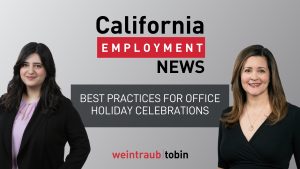 With the holiday season upon us, there are some important tips for employers to keep in mind for holiday gatherings and celebrations.
With the holiday season upon us, there are some important tips for employers to keep in mind for holiday gatherings and celebrations. 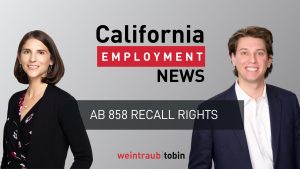 In this episode, Weintraub Tobin attorneys
In this episode, Weintraub Tobin attorneys 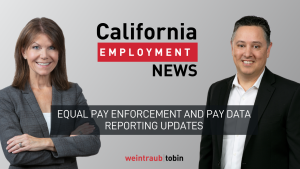 Senate Bills 642 and 464 are set to take effect at the start of the new year, bringing important changes to the California workplace. Weintraub employment attorneys
Senate Bills 642 and 464 are set to take effect at the start of the new year, bringing important changes to the California workplace. Weintraub employment attorneys 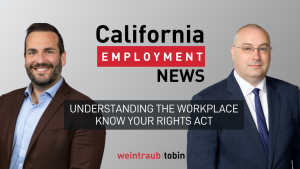 The Workplace Know Your Rights Act – SB 294, takes effect on January 1st, 2026 and provides requirements for employers to notify employees of their rights related to law enforcement interactions at work, as well as providing the option for employers to notify an emergency contact in the event of an employee’s arrest at the workplace. Weintraub Tobin attorneys
The Workplace Know Your Rights Act – SB 294, takes effect on January 1st, 2026 and provides requirements for employers to notify employees of their rights related to law enforcement interactions at work, as well as providing the option for employers to notify an emergency contact in the event of an employee’s arrest at the workplace. Weintraub Tobin attorneys 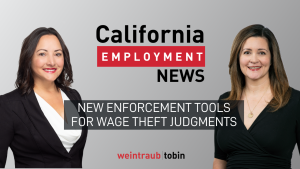 In this episode of California Employment News, Weintraub Tobin attorneys
In this episode of California Employment News, Weintraub Tobin attorneys 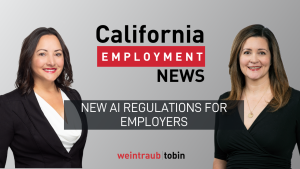 California’s new AI regulations will take effect on October 1, 2025, impacting how employers can use automated tools in hiring, recruitment, and beyond. In this episode of California Employment News, Weintraub attorneys
California’s new AI regulations will take effect on October 1, 2025, impacting how employers can use automated tools in hiring, recruitment, and beyond. In this episode of California Employment News, Weintraub attorneys